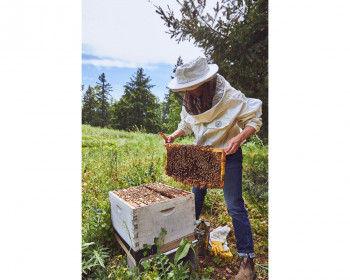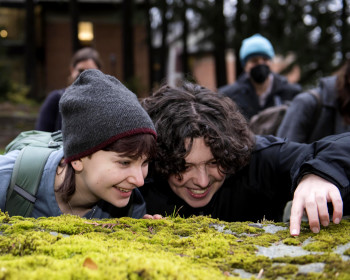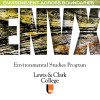Q&A with Professor Paulette Bierzychudek
Open gallery

Paulette Bierzychudek, William Swindells, Sr. Professor of Natural Sciences, joined the Lewis & Clark faculty in 1995. She teaches and advises students in both Biology and Environmental Studies. The Source caught up with Paulette to learn more about her areas of expertise.
When did you first become interested in sustainability?
I’ve always been interested in conserving habitats and natural resources, but my interest in “sustainability” as a concept probably dates back to 1993, when I was first developing Biology 141, Investigations in Ecology and Environmental Science, one of the biology core courses, and an important Environmental Studies elective. Sustainability seemed an essential organizing principle for that course.
Can you tell us about your grant from the National Fish and Wildlife Foundation?
The National Fish and Wildlife Foundation is the funding arm of the U.S. Fish and Wildlife Service, which is responsible for the listing and recovery of threatened and endangered species. The grant supported my ongoing research on the threatened Oregon silverspot butterfly; in collaboration with The Nature Conservancy, we’re trying to learn how best to manage the coastal grassland habitat in which it lives.
As a member of the Board of Trustees of the Nature Conservancy’s Oregon Chapter, what were a couple of big changes you saw over the 10 years you were with the organization?
By far the biggest change was the decision by the national office of TNC to become a global organization instead of confining its work to the local or national level. Given that so much of Earth’s biodiversity is found outside U.S. borders, and that many countries lack the resources to carry out effective conservation, even when they have the will, this decision was hugely important. The Oregon office has become involved in conservation initiatives in South America, across the Pacific, and elsewhere in the world. What didn’t change was the Conservancy’s focus on using sound science to make decisions, on careful planning, and on assessing whether their initiatives are having the intended effects. Serving on the Board was a great experience.
How do you engage your students in sustainable matters as a professor of Biology and Environmental Studies?
Scientists understand that there are biological and physical principles that govern the behavior of matter and energy. My job is conveying those principles. Once students learn that “recycling” of matter is essential for the continuance of life on Earth, for example, it’s natural to apply that principle to their own behavior. In other words, I give students the scientific information (about population growth, harvesting of fish and forests, combustion of fossil fuels, etc.) that allows them to understand the consequences of different choices, and let them make their own decisions. Lewis & Clark students don’t need much encouragement to act responsibly.
In what ways do you practice sustainability in your life?
Human impact is the product of the number of people on Earth and each person’s use of resources. I don’t know if my practices are “sustainable,” but I try to minimize my impact. Not having children is one big step. In addition, my partner and I installed solar panels that provide 90% of our energy; we bike to work and walk, bike, or use public transportation whenever possible; we replaced our lawn with less-thirsty plants, including lots of fruit and vegetables that I can, preserve, and share; we get much of our food (vegetables, meat, dairy) from local farmers; we eat only sustainably-harvested fish. We don’t buy much “stuff”; we line-dry our clothes, mend, repair or repurpose things instead of discarding them, and compost or recycle everything we can. Our backyard, which used to be a grass desert, teems with tomatoes and raspberries, and swarms with hummingbirds, butterflies, and bees. Instead of feeling like I’m sacrificing, I love the simplicity (and great food!) of this lifestyle.
More Environmental Studies Stories
Environmental Studies is located in room 343A of John R. Howard Hall on the Undergraduate Campus.
MSC: 62
email envs@lclark.edu
voice 503-768-7790
fax 503-768-7620
Symposium Advisor Jessica Kleiss
Environmental Studies
Lewis & Clark
615 S. Palatine Hill Road MSC 62
Portland OR 97219


